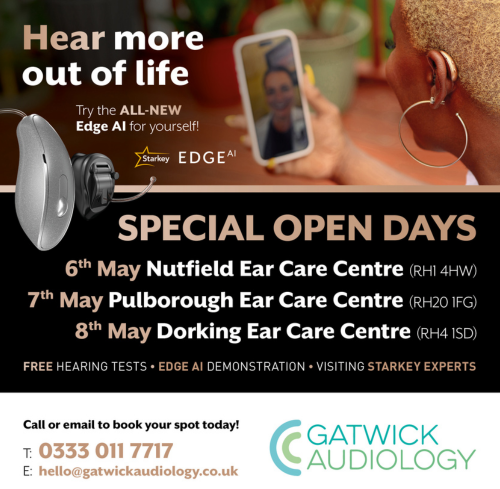
The importance of a hearing test
April 16, 2024
Gatwick Audiology holds Open Days with FREE support and advice to mark national Deaf Awareness Week
April 25, 2024Untreated hearing loss can have a profound impact on cognitive function and mental health and a number of studies have shown a connection between hearing loss and the risk of dementia.

The research suggests that the likelihood of developing dementia is lower for those who wear hearing aids.
It builds on important studies in recent years pulled together by the Lancet Commission on Dementia Prevention, Intervention and Care, through which hearing loss emerged as an important risk factor for dementia. This research suggests that wearing a hearing aid may mitigate that risk.
The research was conducted by the University of Exeter and King’s College London and is presented at the Alzheimer’s Association International Conference in LA. In the PROTECT online study of 25,000 people aged 50 or over.
The findings provide early evidence that encouraging people to wear an effective hearing aid may help to protect their brains and reduce their risk of dementia.
Both groups undertook annual cognitive tests over two years. After that time, the group who wore hearing aids performed better in measures assessing working memory and aspects of attention than those who did not. On one attention measure, people who wore hearing aids showed faster reaction times – in everyday terms, this is a reflection of concentration, for example, ‘straining to hear a sound’, ‘peering closely at an object of great interest’, ‘listening intently to someone speaking’.
PROTECT lead Dr Anne Corbett, from the University of Exeter, said: “Previous research has shown that hearing loss is linked to a loss of brain function, memory and an increased risk of dementia. Our work is one of the largest studies to look at the impact of wearing a hearing aid, and suggests that wearing a hearing aid could actually protect the brain. We now need more research and a clinical trial to test this and perhaps feed into policy to help keep people healthy in later life.”
In the main, wider research suggests that hearing loss can sometimes be misdiagnosed as dementia. People with dementia can have difficulty communicating with others, including finding the right words, or signs, for what they want to say. They may have difficulty processing what they’ve heard, particularly if there are distractions. According to some researchers, this difficulty in processing information (when there is competing information) can be one of the first signs of cognitive impairment. *source University of Exeter
According to the RNID, who are working closely with Alzheimer’s Research UK, since 2018 to fund research into this important issue, due to understanding of how hearing loss can speed up the onset of dementia, or make the symptoms of dementia appear worse, dementia can heighten the impact of hearing loss.*source RNID
Together, they’ve so far invested more than £850,000 into this area of research, with more planned in the future.
Hearing health and reducing risk
Further evidence suggests that managing hearing loss by regular use of hearing aids could reduce or delay the impact of dementia. It’s therefore important to check our hearing regularly. Over 40% of people over 50 have hearing loss, so checking our hearing in mid-life is especially important. *source RNID
Hearing aids can significantly increase people’s ability to take part in everyday life and communicate with friends and family, improving people’s wellbeing. This potentially reduces the risk of depression and social isolation and slows cognitive decline.
Research is starting to suggest that hearing aids might slow cognitive decline for people who are at high risk of dementia (such as people with cardiovascular disease). More research is needed to show whether they can slow cognitive decline in everyone with age-related hearing loss. *source RNID
Gatwick Audiology offers hearing assessments, which include a thorough assessment of your hearing and impartial independent advice on the most suitable treatment for you. We offer an extensive range of hearing aids from industry-leading manufacturers and fit you with a tailor-made solution.
Contact us on 0333 011 7717 or email hello@gatwickaudiology.co.uk to book an appointment.
*source RNID and the University of Exeter




